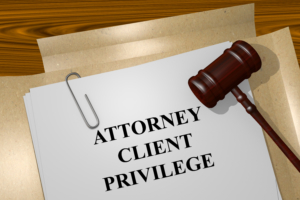 By Fritz Riesmeyer and Emily Crane
By Fritz Riesmeyer and Emily Crane
Trial counsel is increasingly called upon to address an exception to the attorney-client privilege known as the crime-fraud exception. Under this exception, a request is made for communications between a client and its attorney, based upon allegations that the legal advice was used in furtherance of an illegal or fraudulent activity. Such a request can be made before, during, or after trial, and can effectively derail discovery or trial.
It is important to understand the reasoning behind this exception to the privilege, using federal law as a guide. The Supreme Court set forth its reasoning in a 1989 decision, as follows:
The attorney-client privilege is not without its costs. Since the privilege has the effect of withholding relevant information from the factfinder, it applies only where necessary to achieve its purpose. The attorney-client privilege must necessarily protect the confidences of wrongdoers, but the reason for that protection–the centrality of open client and attorney communication to the proper functioning of our adversary system of justice–ceases to operate at a certain point, namely, where the desired advice refers not to prior wrongdoing, but to future wrongdoing. It is the purpose of the crime-fraud exception to the attorney-client privilege to assure that the “seal of secrecy” between lawyer and client does not extend to communications made for the purpose of getting advice for the commission of a fraud or crime.
U.S. v. Zolin, 491 U.S. 554, 562-63 (1989).
Due to the high value the American legal system places on confidential and free communication between attorneys and their clients, a party attempting to invade the privilege is required to take several steps to compel production of otherwise privileged documents, as follows.
- Threshold showing. In weighing preservation of the attorney-client privilege against the legal basis for the crime-fraud exception, the Zolin court found that “the judge should require a showing of a factual basis adequate to support a good faith belief by a reasonable person that in camera review of the materials may reveal evidence to establish the claim that the crime-fraud exception applies.” Id. at 572. This is generally done by a motion, with additional support for the proposition that the communications were given as advice for the commission of a fraud or crime. Id. at 564; see also In re BankAmerica Corp. Sec. Litig., 270 F.3d 639, 642 (8th Cir. 2001).
- Deciding whether to conduct an in camera review. This is a decision based on a number of factors, such as the volume of materials the court is asked to review, the relevance of the allegedly privileged material, and the likelihood the evidence will establish that the crime-fraud exception applies. Zolin at 572.
- Applying the crime-fraud exception. If the court decides to exercise its discretion to review the documents, it must determine whether the documents show “that the legal advice has been obtained in furtherance of an illegal or fraudulent activity.” In re Green Grand Jury Proceedings,492 F.3d 976, 982-83 (8th Cir. 2007). If the answer is yes, the court will order the production of the documents and the privilege is lost.
Practice tips:
- Caution: The question of privilege is generally governed by state law so check state law for variations to this procedure.
- The “threshold showing” (generally by motion) needs to set out as many facts as possible, with emphasis on the discovery of communications with counsel that discuss future, as opposed to prior, wrongdoing. Focus on making a prima facie showing that the communications were made for the purpose of getting advice for the commission of a fraud or crime.
- When opposing a motion, at the “threshold showing” stage, be careful not to overstate your response and position. If documents are produced and reviewed in camera, the party overstating a position or misleading the court on what the documents contain runs the risk of loss of credibility.
- When defending a motion, counsel should emphasize the importance and long history of the attorney-client privilege, as well as the privilege’s purpose–to encourage “full and frank communication between clients and attorneys.” Upjohn Co. v. U.S., 449 U.S. 383, 389 (1981).
- For the party defending against the production, consider requesting that a judge other than the trial judge consider the motion for review of the documents.
Fritz Riesmeyer is a shareholder and Litigation Chair and Emily Crane is a summer intern with Seigfreid Bingham P.C.
